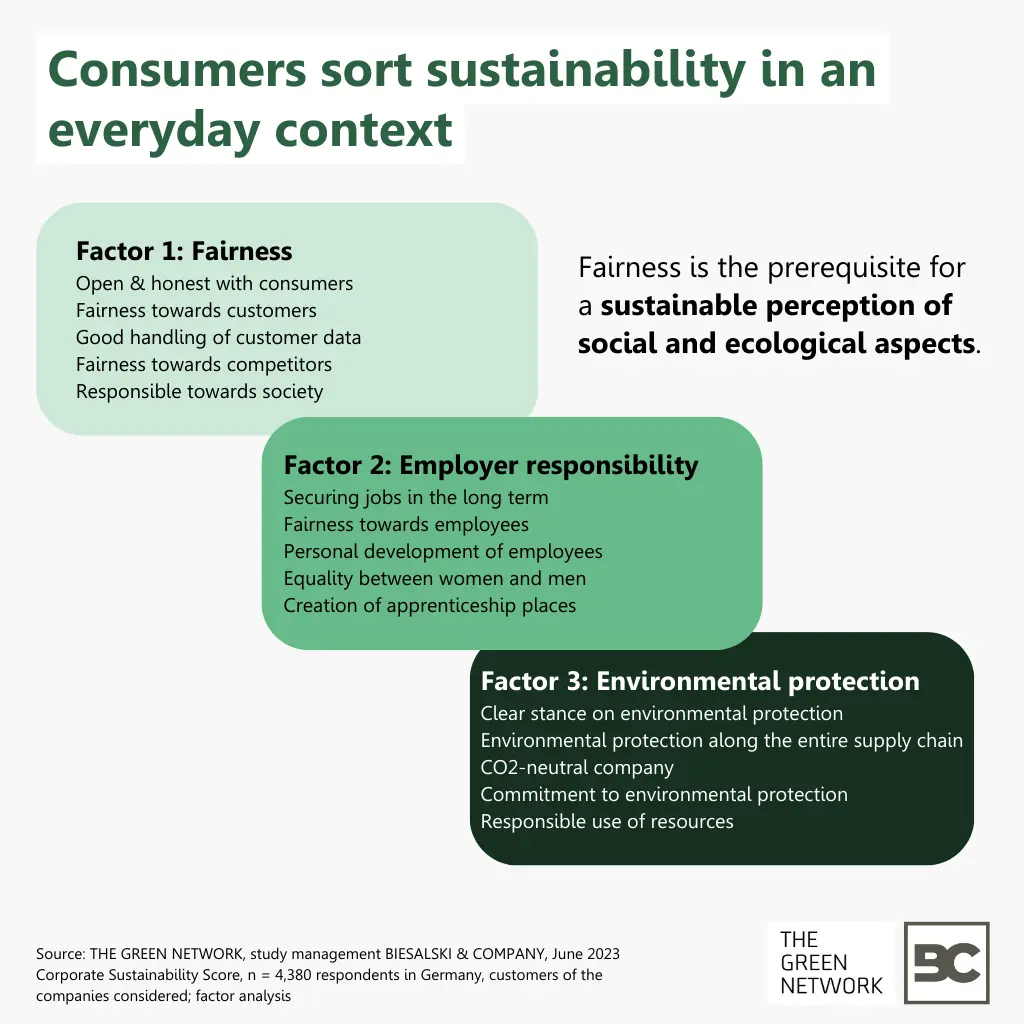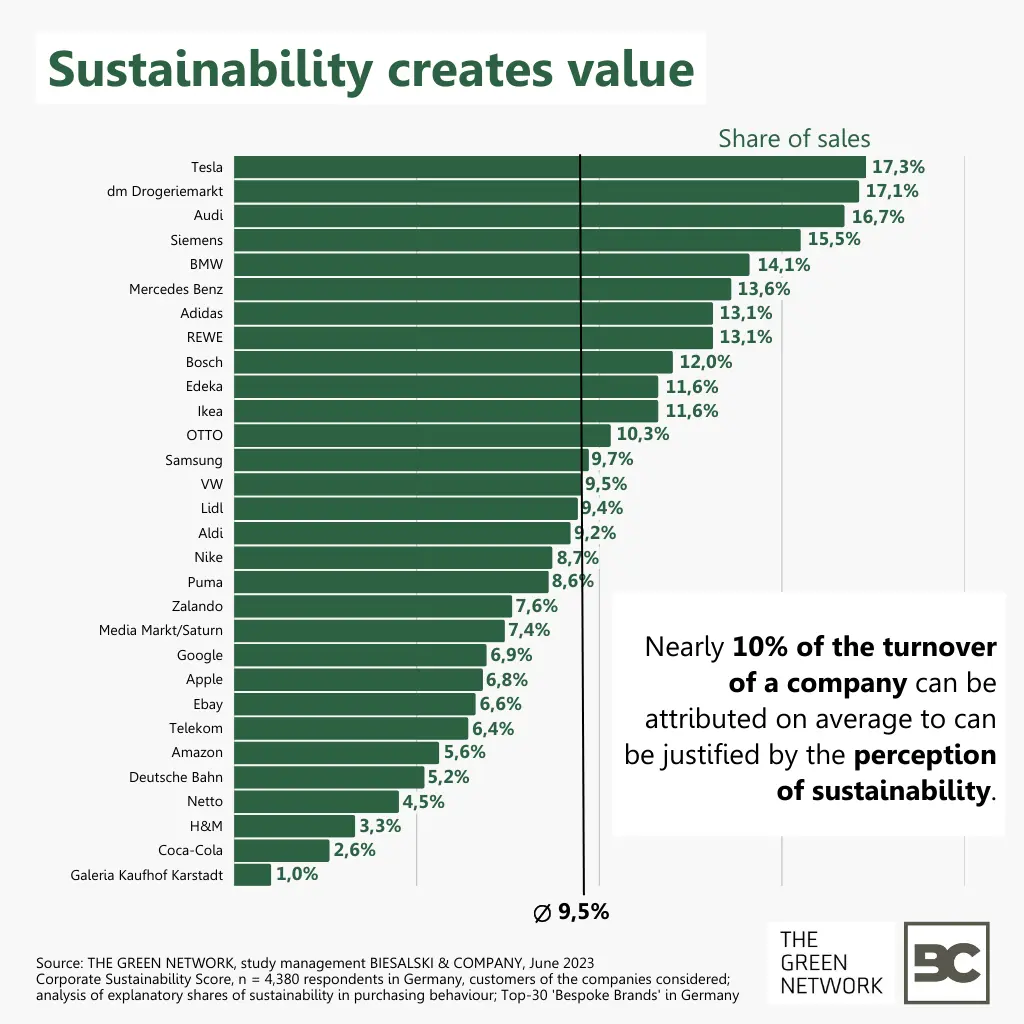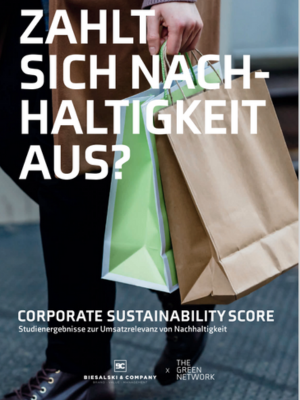Corporate Sustainability Score
Does sustainability pay off?
New study: Sustainability brings amazing sales.
Regarding business, sustainability has been the biggest megatrend for years. In almost every company, sustainability is a strategic goal. Entire industries – such as the automotive industry – are fundamentally changing to become sustainable. And there is also a consensus in society that our future can only be secured by acting sustainably.
It is, therefore, all the more surprising that there is hardly any research on sustainability and sales. In other words, whether consumers are more willing to buy from a sustainable company and eventually pay higher prices – and whether this can be reflected in figures.
With the Corporate Sustainability Score (CSS), the Green Network, under the leadership of Biesalski & Company, has developed an instrument to answer precisely this question. The CSS is a representative survey of how customers assess the sustainability of brands. Focusing exclusively on customers has the advantage that it allows us to determine what triggers purchasing decisions. And that, in turn, means that we can show in figures what proportion of sales are accounted for by sustainability.
Another feature of the CSS is that we ask for all the relevant items that characterize sustainability and simultaneously, have these weighted by the panel participants. The analysis shows which sustainability factors are personally significant for customers – and relevant for purchasing decisions. This creates a picture of sustainability that defines the classic triple bottom line – ecology, social issues, and economy – from the customer’s point of view.
For the study presented here, we first conducted a representative survey to find out which brands are currently of most concern to consumers in Germany. We then examined the 30 „most bespoke brands” with a panel of 4.380 respondents who are clients of these brands.
We presented first insights into the study results of the Corporate Sustainability Score at the GREENTECH FESTIVAL:
Below we present the key findings of our study once again. Please find a detailed analysis in the study volume “Corporate Sustainability Score (CSS) 2023”.
KEY FINDING 1: Customers categorize sustainability under environmental protection, employer responsibility, and fair trade.
Although there were no specifications, customers follow the classic triple bottom line but interpret it more concretely and more in an everyday context. Ecology is directly linked to environmental protection. Social aspects are seen more in terms of fairness. Economy is not anchored in customers’ minds as part of sustainability. Instead, employer responsibility plays a vital role in this context and, in turn, forms an essential prerequisite for the economic success of companies in the future. This realignment reflects the individual experience of a brand from the customer’s point of view and the corresponding prioritization of personal sustainability aspects.

KEY FINDING 2:
On average, just under 10% of sales can be accounted for by sustainability percetions.
In our 30-brand study, the spectrum ranges from Tesla (17.3% explanatory share of sales) to Galeria Kaufhof (1%). On average, sustainability accounts for 9.5% of sales.

KEY FINDING 3: The sustainability share of sales has increased significantly in recent years.
In a similar study from 2017, the explanatory share of sustainability in sales was only slightly slightly 5%
KEY FINDING 4: Acting fairly creates the basis of trust for being perceived as sustainable in other areas as well.
Customers first assess whether they feel fairly treated by „their” brand and perceive it as fair and credible overall. If the verdict is positive, other sustainability aspects, such as environmental protection or employer responsibility, are also rated positively. Conversely, negative assessments of fairness have an impact on all other evaluations.
KEY FINDING 5: There is no general recipe for improving the sustainability image.
A company’s sustainability perception highly depends on its business and other factors. Finding out how to improve the sustainability image requires an individual analysis of the brand in question. Only one thing can be said with certainty: a good rating for fair trading is a prerequisite for doing well overall regarding sustainability perception.
KEY FINDING 6: True fans rate less critically.
The more strongly customers identify with a brand and the more positive their individual brand experience, the more willing they are to give good ratings on sustainability as well. Ranking winner Tesla, for example, has a good score on employer responsibility, although this aspect has often been discussed negatively in the press.
KEY FINDING 7: Environmental protection increases future viability from the customer`s point of view.
Even if, in many cases, environmental protection issues do not make a strong contribution to the purchase decision, they do strengthen the reputation of companies, as this issue, in particular, is strongly associated with future viability.
KEY FINDING 8: Success is possible even without a strong sustainability image (till now).
Today, brand icons like Amazon or Coca-Cola are still content to excel in their core business even without a strong sustainability credential. However, the question arises whether this will not change if intense, sustainable competition emerges.
KEY FINDING 9: Among older people, environmental protection has more influence on brand image evaluation.
When evaluating sustainability image, the perception of environmental protection plays a more significant role among the 56-69 age group compared to younger generations. This could have to do with a higher expectation of younger people concerning sustainability and/or a stronger sensitivity of older people towards the topic.
KEY FINDING 10: Sustainability needs beacons.
Tesla provides proof with a top product that contributes significantly more to environmentally conscious living. The German household appliance manufacturers Bosch and Siemens create more relief in everyday life. In stationary retail, REWE stands out with the creation of jobs. In contrast, Volkswagen is still dragging its feet due to the diesel scandal, and its fairness rating suffers significantly as a result.
CONCLUSION: Perception determines the economic success of sustainability.
10% average explanatory share of sales speaks a) for the meanwhile enormously high relevance of consumer perception of sustainability in the economic success of brands and shows b) that the sustainability perception of brands is still primarily a black box that needs to be explored.
Study volume now available for download!
We derived our Key Findings from an initial analysis of data available to us since the end of May 2023. You can read the final results in the detailed study volume on the “Corporate Sustainability Score (CSS) 2023”, which you can download here.
Further publications:

Find the article “Does sustainability pay off?” in the current issue here.

The first exciting study insights and the ranking of the top 30 brands can be found here.

The article “No company profits as much from its sustainable image as Tesla” can be found here.
Request study volume!
You are welcome to receive the study volume “Corporate Sustainability Score (CSS) 2023” by post as soon as possible, hot off the press. Simply enter your contact details in the form below:
Your contact
Alexander Biesalski
MANAGING PARTNER


